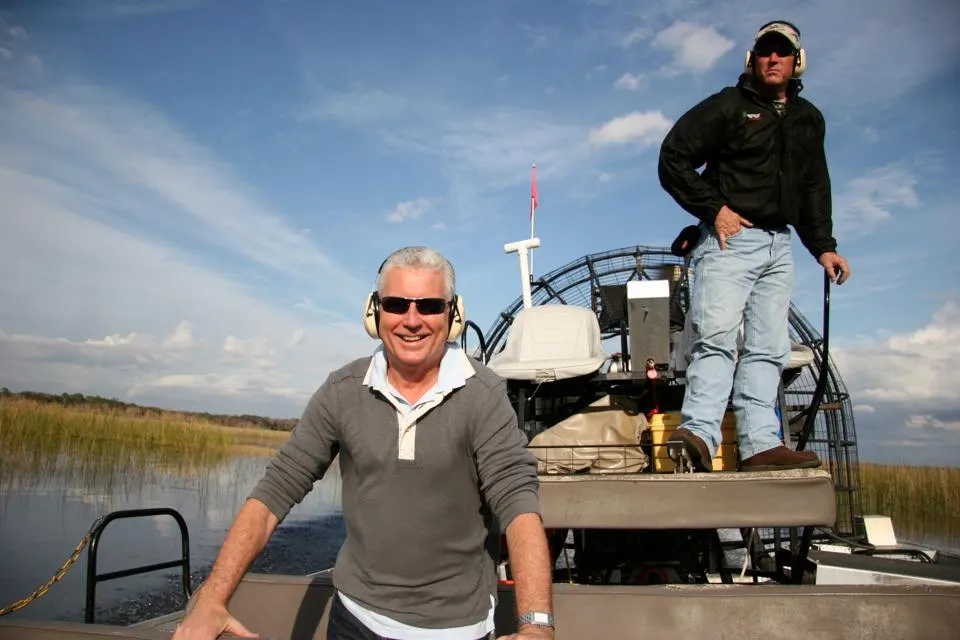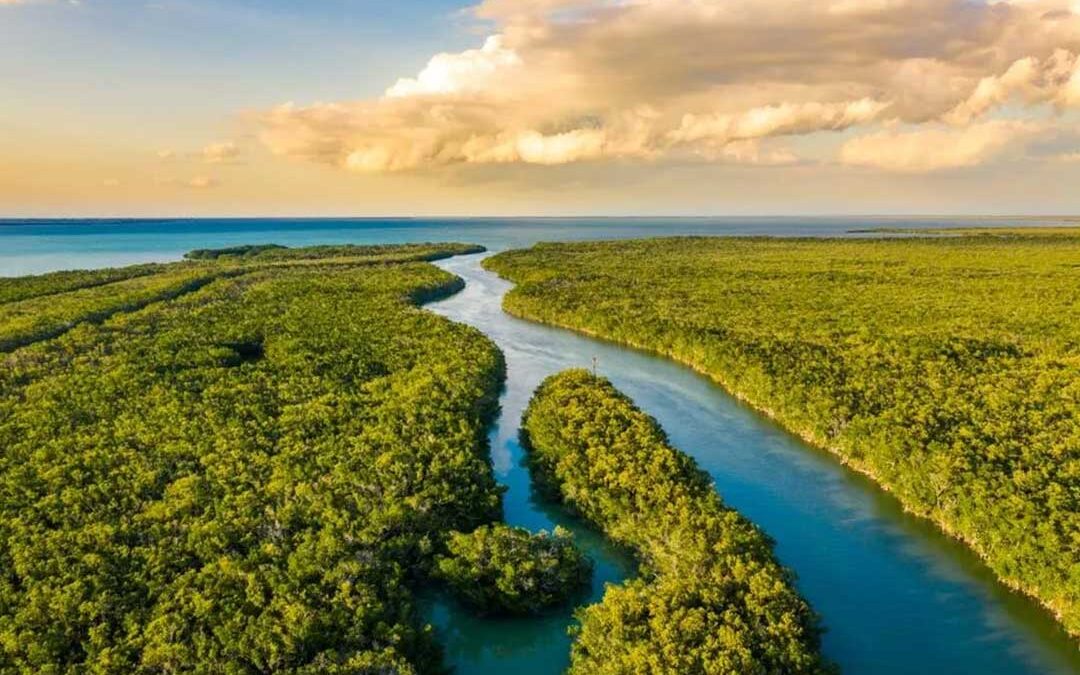When DeSantis first ran for Governor in 2018, Florida was experiencing headline-grabbing environmental problems ranging from fish-killing red tides and toxic algae blooms to manatee die-offs and invasive species that were alarming residents and giving tourists pause.
DeSantis called on fellow Republicans to take a stronger stand on conservation, saying it was, “…a great opportunity to claim this as our mantle.”

Florida Governor DeSantis has secured $6.5 billion in funding for Everglades restoration. Photo courtesy Tribune News Service via Getty Images.
Such a position also supports Florida’s major economic driver of tourism. The state has more than 800 miles of beaches and dozens of state and national parks as well as wildlife refuges that helped attract a record 143 million visitors, many from across the globe, in 2024. That same year, Florida’s tourism industry generated $128 billion in economic impact and supported 2.1 million jobs—adding nearly $40 billion in tax revenue to state coffers.
DeSantis’ policies in Florida—including his unprecedented effort to save the Everglades—were well received and led to his landslide re-election in 2022, besting Democrat Charlie Crist by nearly 20 percent. His approval ratings have reached as high as 62 percent, and many Republicans see him as a top contender if he makes another run for the White House in 2028. What’s certain is that few Republican challengers are apt to offer voters a stronger record on conservation.
Everglades Foundation CEO Eric Eikenberg told Politico in a 2023 interview, that DeSantis is a “true champion” of conservation. “He came into office and on day one made it clear this was going to be a priority.”

Conservationist Paul Tudor Jones applauds DeSantis’ work to save the Everglades. Photo courtesy Method Times.
“Saving the Everglades will be one of Governor DeSantis’ most important and lasting legacies,” says Rodney Barreto, Florida Fish and Wildlife Conservation Commission chair and veteran conservation philanthropist. “It’s not easy balancing the demands of all sides in a large state like Florida, but his conservation compass has been unwavering.”
“The most difficult element to find in the conservation movement is leadership,” says long-time philanthropist and Everglades Foundation creator Paul Tudor Jones. “Governor DeSantis stepped into the arena and led the fight to save our beloved Everglades. Every Floridian owes him a debt of gratitude for that.”
“The Everglades are not just a Florida treasure,” says Emmy-nominated director Mike Slee who is at work on a giant screen film celebration of the ecosystem. “Its international significance is on the order of the Amazon and the Serengeti. When people see this film and step inside the immersive experience of the giant screen, they’ll come to know the value of this wetland like never before. The vision to save the Everglades is a generational gift the magnitude of which cannot be overstated.”

A giant screen film showcasing the ecological significance of the Everglades is in production. Photo courtesy Mission Partners Entertainment Group.
Pragmatic conservationists who see a future where the environment, development and agriculture can all win by employing the right strategies, view DeSantis’ positions as the best path forward in a state where balancing economic and environmental demands is an everyday challenge. Pleasing a majority of the people most of the time is a best-case political scenario.
The chasm between environmental groups and conservation organizations, however, is part of a larger national debate about the future of everything from green energy and electric vehicles to agricultural policy and habitat protection. Most differentiate conservation as the wise use and stewardship of natural resources while environmentalism tends to focus on preservation with little to no use of resources. Positions on the environment often run on clear political divides—a fact likely not lost on DeSantis.

Filmmaker Mike Slee gets an airboat tour of the Everglades. Photo courtesy Mission Partners Entertainment Group.
In a recent Pew study, 78 percent of Democrats and 20 percent of Republicans prioritize the environment over the economy, the 58-point gap being the largest such trend since 1984. In the case of Florida and many other states, however, the health of the environment is directly tied to economic success. DeSantis recognized that and refused the notion that you can’t have a healthy environment and a strong economy, instead seeing them as intricately connected in Florida. It’s a winning position more Republicans are apt to embrace if the electorate proves unwilling to sacrifice too much environmental health for economic gain.
Even popular television series have entered the environment-versus-economy debate. Taylor Sheridan, creator of many of Hollywood’s biggest current hits including Yellowstone, Landman, and Tulsa King, has written eco topics into some of his main characters’ most memorable narratives, challenging commonly promoted notions about green energy and agriculture, for instance. Taking on such conventions with a center-right viewpoint might help explain the popularity of Sheridan’s series—if for no other reason than such red-state sensibilities seldom make their way past left-leaning pop culture gatekeepers.

A bird’s eye view of the liquid labyrinth that is the Florida Everglades. Photo courtesy Getty.
In Sheridan’s Landman, Billy Bob Thornton’s Tommy Norris character delivers an epistle on the myth of wind turbines and green energy, reinforcing the reality of our continued dependence on oil whether we like it or not.
Moreover, in the mega-hit Yellowstone, Sheridan had Kevin Costner’s character John Dutton question whether a vegetarian diet is better for the environment, delivering a Ted Nugent-inspired manifesto on how conventional farming techniques that produce monoculture crops with the heavy use of pesticides and herbicides that sterilize the landscape are far from being greener than cattle ranching as many vegetarians often espouse. Reduced to a bumper sticker: Eat a steak, save the salamander.
That such Hollywood hits are now reaching millions of viewers across the globe with a message that challenges green energy assumptions often advanced by mainstream media might help explain a shift in the cultural zeitgeist. More often, for instance, consumers are asking just how environmentally friendly electric vehicles really are given the fossil fuel-generated power needed to run them, where and how the lithium for their batteries is mined, and what becomes of those batteries when it comes time to dispose of them?
Ipsos, a market research firm, found that while most people still agree that electric vehicles hold environmental benefits over gas cars, that majority has declined significantly since 2022. Politicians—especially Republicans—have taken note as the green movement fades and gives way to more centrist conservation approaches.
“Whether in Florida or elsewhere, the reality is that the nation must have food, fiber and energy to thrive. Conservation and business must work in collaboration,” says Charles Potter, President and CEO of Chicago-based Max McGraw Wildlife Foundation, a leader in conservation innovation and communication. “Thus, we have to develop strategies that can advance our economy while at the same time protecting land, air and water quality as well as a legacy of healthy wildlife and fisheries.”
And that’s a view shared by DeSantis who has embraced saving Florida’s most important ecosystem and industry–tourism–while at the same time bolstering his political future.

